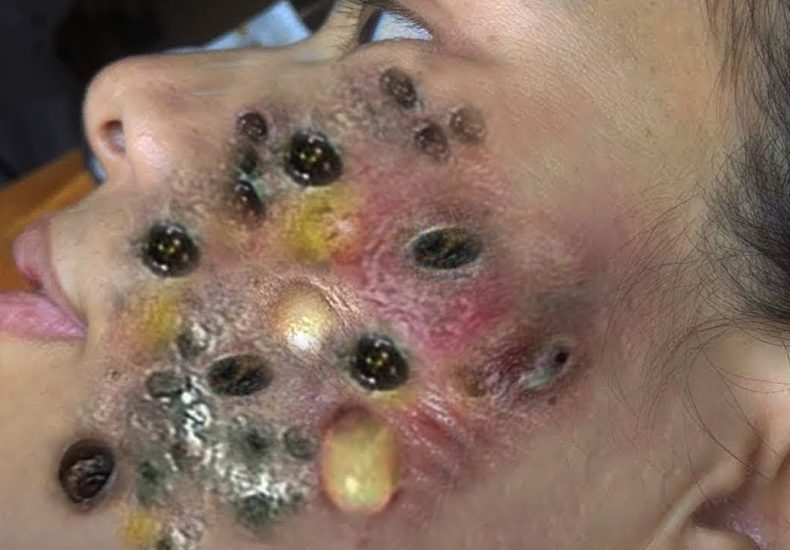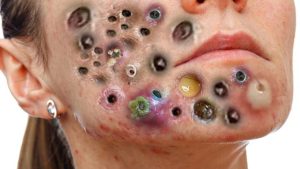
Big acne
Big acne
Please scroll down to watch the video.👇👇
Hey there! I think you might have meant “how do you get big acne”? Or maybe “how do you treat big acne”? Either way, let’s cover both possibilities just in case! (•̀ᴗ•́)و
If you’re asking how to get rid of big pimples :
Here are some effective ways to treat large or stubborn pimples:
- Don’t pop it! 🙈
- Popping can cause more inflammation, scarring, and even infection.
- Use a spot treatment :
- Look for products with benzoyl peroxide , salicylic acid , or adapalene (a retinoid) .
- These help reduce inflammation and unclog pores.
- Warm compress :
- Applying a warm compress can help bring the pimple to a head and reduce swelling.
- Keep your skin clean & gentle :
- Wash your face twice daily with a mild cleanser.
- Avoid harsh scrubs or over-washing.
- Don’t touch your face :
- Hands can transfer oil and bacteria, making acne worse.
- See a dermatologist :
- For severe or cystic acne, a dermatologist may prescribe oral antibiotics, isotretinoin (Accutane), or give you a cortisone injection to shrink the pimple fast.
If you’re asking how do you get big acne :
Big pimples usually form due to:
- Clogged pores : Oil, dead skin cells, and bacteria get trapped under the skin.
- Hormones : Especially during puberty, menstruation, or stress, hormones can increase oil production.
- Inflammation : When the pore wall breaks, it causes a bigger, more painful pimple.
- Diet : Some studies suggest dairy or high-glycemic foods may contribute to acne in some people.
- Skincare products : Using comedogenic (pore-clogging) products can lead to breakouts.
Let me know if you want product recommendations or natural remedies too! 😊
And feel free to clarify if I misunderstood — no judgment here! 💛

Absolutely! Here’s a more detailed and medically backed explanation on how to treat big pimples (papules, pustules, or cysts) with references from reputable dermatological sources.
🧾 How to Treat Big Acne: A Detailed Guide
Big acne — such as papules, pustules, nodules, or cysts — can be painful, inflamed, and long-lasting. Proper treatment depends on the severity and type of acne you’re dealing with.
🔬 Understanding What Causes Big Pimples
Big pimples form when:
- Excess sebum production clogs pores.
- Dead skin cells build up and block hair follicles.
- Bacterial overgrowth (Propionibacterium acnes ) leads to inflammation.
- Inflammation spreads deeper into the skin, causing large, red, sometimes pus-filled bumps.
This process is especially pronounced in nodular or cystic acne , which are considered severe forms of acne and often require medical treatment.
✅ Top Treatment Options for Big Pimples
1. Topical Treatments
a) Benzoyl Peroxide
- How it works : Kills P. acnes bacteria, reduces inflammation, and helps remove dead skin cells.
- Effectiveness : Reduces lesion size within a few days to a week.
- Usage : Apply once or twice daily after cleansing.
- Side effects : May cause dryness, peeling, or irritation.
Reference : American Academy of Dermatology Association (AAD). Acne Treatments
b) Salicylic Acid
- How it works : Exfoliates skin and unclogs pores.
- Best for : Non-inflammatory comedones but also helpful early on for inflammatory lesions.
- Usage : Can be used daily in cleansers or toners.
Source : National Institute of Arthritis and Musculoskeletal and Skin Diseases (NIAMS)
c) Topical Retinoids (e.g., Adapalene, Tretinoin)
- How it works : Prevents pores from getting clogged by increasing cell turnover.
- Prescription needed? Adapalene 0.1% is OTC; stronger retinoids require a prescription.
- Important note : Use at night and apply moisturizer if irritation occurs.
Reference : Mayo Clinic – Acne Drugs
2. Warm Compress or Ice Pack
- Warm compress : Encourages drainage and brings the pimple to a head.
- Ice pack : Reduces swelling and pain, especially for inflamed pimples.
Tip : Wrap ice in a clean cloth and apply for no more than 5 minutes at a time.
3. Cortisone Injections (by Dermatologist)
- For severe cystic acne , a dermatologist may inject a diluted corticosteroid directly into the pimple.
- Results : Dramatic reduction in size and redness within 24–48 hours.
- Use case : Often used for large, painful, isolated cysts before important events.
Reference : American Society for Dermatologic Surgery (ASDS) – Corticosteroid Injections for Cysts and Nodules
4. Oral Medications (for moderate to severe acne)
a) Antibiotics (e.g., Doxycycline, Minocycline)
- How it works : Reduces bacteria and inflammation.
- Duration : Typically prescribed short-term (weeks to months).
- Combination therapy : Usually paired with topical treatments.
Source : AAD – Oral Antibiotics for Acne
b) Hormonal Therapies (e.g., Birth control pills, Spironolactone)
- For women only : Helps reduce hormonal breakouts by lowering androgen levels.
- Spironolactone : Off-label use for acne in adult women.
Reference : Journal of the American Academy of Dermatology (JAAD), 2020
c) Isotretinoin (Accutane)
- For severe cystic acne not responding to other treatments.
- Effectiveness : 80–90% of patients experience long-term remission.
- Risks : Requires close monitoring due to potential side effects (e.g., dry skin, mood changes, birth defects).
Source : U.S. Food and Drug Administration (FDA) – Isotretinoin Labeling
5. Lifestyle & Skincare Tips
|
Tip
|
Benefit
|
|---|---|
|
Avoid touching your face
|
Prevents transferring bacteria and oils.
|
|
Use non-comedogenic products
|
Won’t clog pores.
|
|
Wash pillowcases regularly
|
Reduces bacterial buildup.
|
|
Don’t over-cleanse
|
Overwashing strips natural oils and worsens acne.
|
|
Eat a balanced diet
|
Some studies suggest high-glycemic foods and dairy may exacerbate acne in some people.
|
Reference : Harvard T.H. Chan School of Public Health – Diet and Acne
📝 Summary Table
|
Treatment
|
Type
|
Effectiveness
|
Notes
|
|---|---|---|---|
|
Benzoyl Peroxide
|
Topical
|
Moderate
|
Fast-acting, kills bacteria
|
|
Salicylic Acid
|
Topical
|
Mild-Moderate
|
Good for unclogging pores
|
|
Retinoids (Adapalene, Tretinoin)
|
Topical
|
Moderate-High
|
Best used nightly
|
|
Warm Compress
|
Home remedy
|
Low-Moderate
|
Encourages drainage
|
|
Cortisone Injection
|
Medical
|
High
|
Only by dermatologist
|
|
Oral Antibiotics
|
Prescription
|
High
|
Short-term use
|
|
Hormonal Therapy
|
Prescription
|
High
|
For adult women
|
|
Isotretinoin (Accutane)
|
Prescription
|
Very High
|
Requires monitoring
|
🩺 When to See a Dermatologist
You should consider seeing a dermatologist if:
- You have painful, deep, or recurring pimples
- Acne is leaving scars or dark spots
- Over-the-counter treatments aren’t working
- Acne is affecting your self-esteem or mental health
You may also like
Archives
Calendar
| M | T | W | T | F | S | S |
|---|---|---|---|---|---|---|
| 1 | ||||||
| 2 | 3 | 4 | 5 | 6 | 7 | 8 |
| 9 | 10 | 11 | 12 | 13 | 14 | 15 |
| 16 | 17 | 18 | 19 | 20 | 21 | 22 |
| 23 | 24 | 25 | 26 | 27 | 28 | 29 |
| 30 | ||||||
Leave a Reply